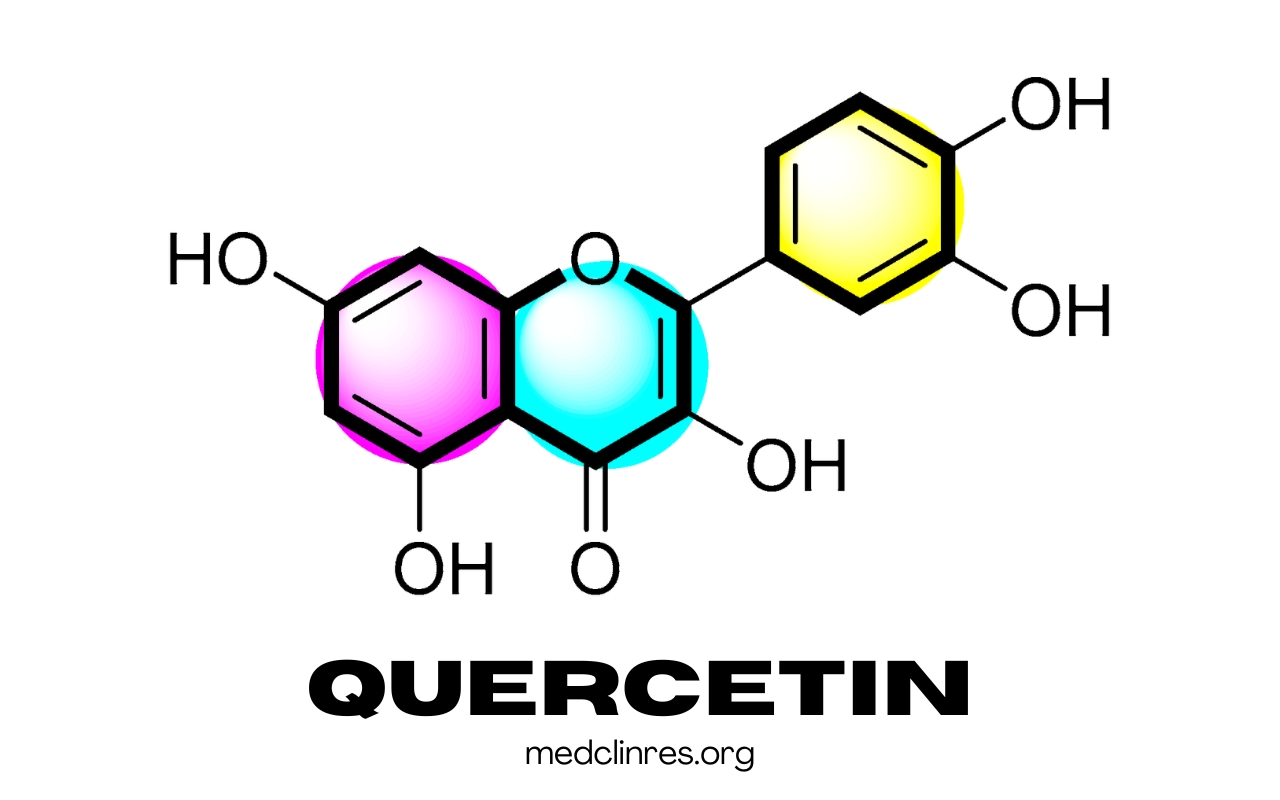
At MedClinRes.org, our research team is dedicated to exploring natural compounds with proven health benefits. Quercetin, a potent flavonoid found in a variety of fruits, vegetables, and grains, has gained attention for its antioxidant, anti-inflammatory, and immune-supporting properties. This detailed guide examines quercetin’s benefits, potential side effects, recommended dosage, and the best dietary sources to help integrate this powerful compound into a balanced health regimen.
What is Quercetin?
Quercetin is a naturally occurring pigment that belongs to the flavonoid family. Flavonoids are bioactive compounds present in plants, known for their antioxidant activities and health-promoting effects. Quercetin is particularly abundant in:
- Fruits: Apples, grapes, berries, and citrus fruits.
- Vegetables: Onions, broccoli, kale, and asparagus.
- Grains and Seeds: Buckwheat and capers.
- Beverages: Green tea, black tea, and red wine.
Quercetin’s primary role as an antioxidant involves neutralizing free radicals—unstable molecules that can damage cells and contribute to chronic conditions such as cardiovascular disease, cancer, and neurodegenerative disorders.
Benefits of Quercetin
1. Reduces Inflammation
Quercetin’s anti-inflammatory properties help modulate the body’s inflammatory response by inhibiting pro-inflammatory molecules such as TNF-alpha and interleukin-6 (IL-6). This makes it beneficial for conditions associated with chronic inflammation, including arthritis and inflammatory bowel disease.
2. Supports Immune Function
Studies suggest that quercetin can boost immunity by enhancing the body’s natural defense mechanisms. It may help reduce the severity of viral infections and support recovery by modulating immune cell activity.
3. Improves Heart Health
Quercetin contributes to cardiovascular wellness by promoting blood vessel health and reducing blood pressure. Its antioxidant action helps lower oxidative stress, which is a contributing factor to atherosclerosis and heart disease.
4. May Aid in Cancer Prevention
Preclinical research indicates that quercetin may inhibit the growth of cancer cells and promote apoptosis (programmed cell death) in certain types of cancer, including prostate, breast, and colon cancers. However, more clinical studies in humans are required to establish its role in cancer treatment.
5. Enhances Brain Health
Quercetin’s neuroprotective effects may reduce the risk of cognitive decline and protect against diseases such as Alzheimer’s and dementia. It works by combating oxidative stress in brain cells and supporting overall cognitive function.
6. Potential Benefits for Exercise Performance
Some studies show that quercetin may improve exercise endurance and recovery by enhancing mitochondrial function and reducing exercise-induced inflammation.
Side Effects and Safety Considerations
Quercetin is generally safe when consumed in food amounts. As a supplement, it is well-tolerated, but high doses (over 1,000 mg per day) may lead to mild side effects such as:
- Headaches
- Stomach discomfort
- Tingling sensations
Precautions
- Pregnancy and Breastfeeding: While dietary sources of quercetin are safe, the effects of high-dose supplements during pregnancy and lactation are not well-studied. It is advisable to avoid supplementation unless recommended by a healthcare provider.
- Medication Interactions: Quercetin may interact with certain medications, including antibiotics and blood pressure medications. Always consult a healthcare professional before starting a new supplement.
Recommended Dosage of Quercetin
The appropriate dosage of quercetin depends on the intended use:
- For General Wellness: 500 mg per day, often combined with vitamin C or bromelain to enhance absorption.
- For Allergies or Inflammation: Up to 1,000 mg per day, split into two doses.
- For Athletic Performance: 500–1,000 mg per day, typically taken 30–90 minutes before exercise.
To improve bioavailability, quercetin supplements often include other compounds such as:
- Vitamin C: Enhances absorption.
- Bromelain: A digestive enzyme that increases bioavailability.
- Resveratrol and Catechins: Other flavonoids that may have synergistic effects with quercetin.
Best Food Sources of Quercetin
For those looking to boost their quercetin intake naturally, here are some of the best dietary sources:
- Capers: Among the highest sources, providing significant amounts of quercetin per serving.
- Onions (red and white): A staple in many cuisines, onions are a convenient and rich source of quercetin.
- Berries: Blueberries, cranberries, and raspberries not only offer quercetin but also provide other beneficial antioxidants.
- Apples (especially with skin): Red apples are particularly high in quercetin, contributing to heart and immune health.
- Green and Black Tea: Regular consumption of these teas can provide a steady intake of quercetin along with other beneficial polyphenols.
The Bottom Line
Quercetin is a versatile and powerful antioxidant with numerous potential health benefits, from reducing inflammation and boosting immune function to promoting heart and brain health. While dietary sources are sufficient for general wellness, supplements can provide targeted support for specific health needs, such as allergy relief or exercise performance.
At MedClinRes.org, our research emphasizes the importance of integrating natural compounds like quercetin into a comprehensive approach to health and wellness. For personalized advice on quercetin supplementation, consult a healthcare professional to ensure it fits safely into your health regimen.
Also Read: Mullein Leaf Extract for Better Breathing